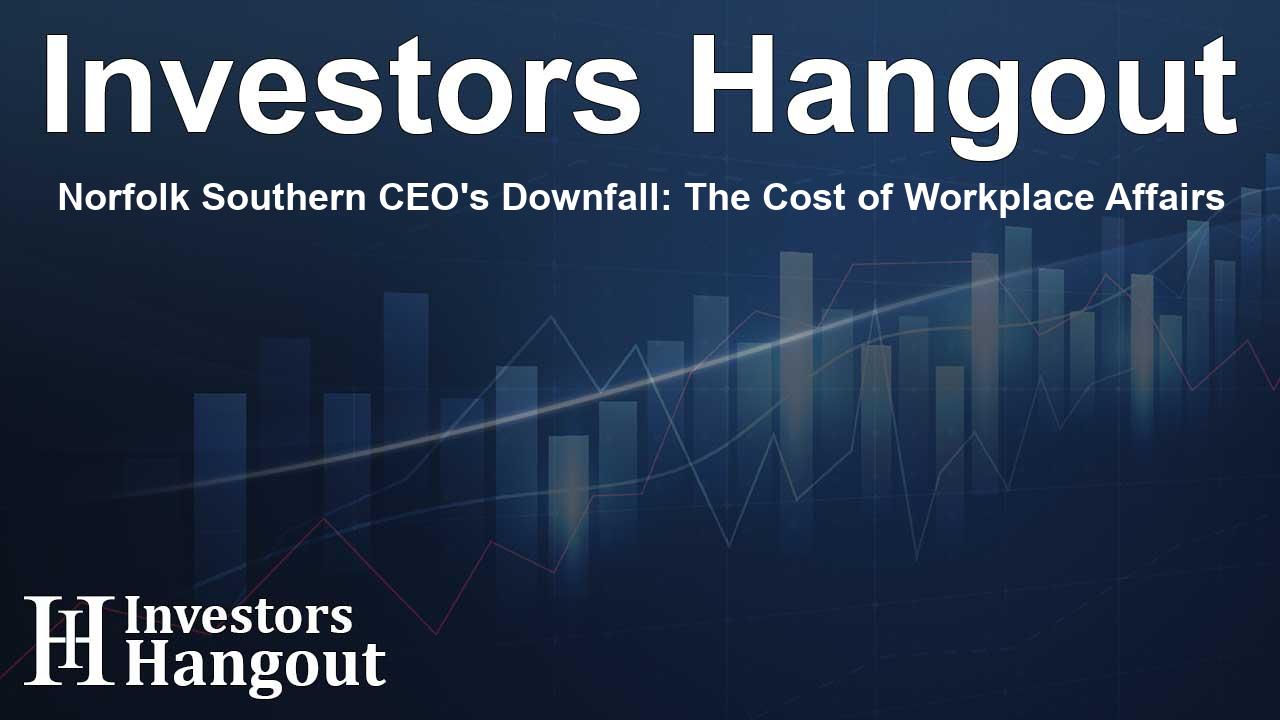Norfolk Southern CEO's Downfall: The Cost of Workplace Affairs

The Imminent Shake-Up at Norfolk Southern
The corporate world is often rife with dramatic exits, especially when it comes to CEOs of Fortune 500 companies. One of the latest high-profile departures is that of the former chief executive of Norfolk Southern, Alan Shaw. His exit, however, comes not with a golden handshake but rather a termination without the benefits typically associated with such high-ranking positions.
Shaw was removed from his position after it was discovered that he engaged in an inappropriate romantic relationship with the chief legal officer, violating company policy. Unlike many CEOs who receive compensation upon leaving, Shaw's dismissal was categorized as a firing for cause, meaning he will not receive the severance benefits outlined in Norfolk Southern's executive severance plan.
Implications of a Little Romance
Shaw's controversial dismissal raises several questions, particularly surrounding his substantial compensation package. In 2023, Shaw's base salary was reported at $1.1 million, and he was also eligible for stock and option awards exceeding $10 million as part of his $13.4 million total compensation. However, due to his termination for cause, he forfeits these financial benefits.
Had he left under different circumstances, Shaw would have received a severance payment of double his salary, along with cash for his restricted stock and outstanding options. This pecuniary loss marks a stark departure from the norm for executives who typically enjoy substantial financial backing even after their exit.
The Growing Trend of Clawbacks
The conversation around Shaw’s termination also touches on a rising trend in business called "clawbacks." This practice allows companies to reclaim compensation given to executives under certain circumstances, particularly when issues of misconduct surface. The Securities and Exchange Commission (SEC) recently instituted rules to encourage companies to adopt clawback policies, empowering them to recover pay from executives who engage in unethical behavior.
Norfolk Southern, as one of the four largest freight railroads in the United States, falls within this new paradigm. Although it is unclear whether the company plans to pursue reclaiming any of Shaw's previous earnings, there has been a noticeable shift among corporations to consider such actions in the wake of growing scrutiny and accountability.
Precedents in Clawback Policies
The case of Alan Shaw is not isolated. For instance, the Royal Bank of Canada is currently embroiled in its own clawback battle involving former CFO Nadine Ahn and finance executive Ken Mason. The bank has sought to recover approximately $3.2 million, claiming that the two maintained an undisclosed relationship that influenced promotions and salary raises during their tenure. This case underscores the increasing prevalence of clawbacks as companies strive to hold executives accountable for their actions.
Data from recent analytics indicate that since the SEC's rules took effect, a notable number of companies have pursued clawbacks. Reports show that 16 firms have initiated clawbacks against 19 executives, reflecting a new era of corporate accountability.
Consequences for Corporate Leadership
Ultimately, Shaw's downfall illustrates the severe consequences that can arise from personal indiscretions in a corporate environment. Not only does he face the loss of significant financial benefits, but this incident may also tarnish his reputation and future career prospects.
When reached for comments, Norfolk Southern remains tight-lipped about whether a clawback of Shaw’s compensation is on the table. The situation serves as a wake-up call for executives in similar firms, emphasizing the importance of adhering to company policies not just for personal integrity but also for financial security.
Frequently Asked Questions
What caused Alan Shaw's termination from Norfolk Southern?
Alan Shaw was terminated after it was discovered that he was involved in a consensual romantic relationship with the company's chief legal officer, violating company policy.
Will Alan Shaw receive severance pay after his firing?
No, Alan Shaw was terminated for cause, which means he will not receive the severance benefits he would have typically been entitled to under the company's plan.
What does the term "clawback" mean in a corporate context?
Clawbacks refer to policies that allow companies to recover compensation from executives after instances of misconduct or when company financials are restated.
Are clawback policies becoming more common among corporations?
Yes, many companies are beginning to implement clawback policies as part of their efforts to hold executives accountable for their actions.
What other ramifications may Alan Shaw face following his termination?
Beyond financial loss, Shaw may face challenges in securing future employment and damage to his professional reputation as a result of this incident.
About Investors Hangout
Investors Hangout is a leading online stock forum for financial discussion and learning, offering a wide range of free tools and resources. It draws in traders of all levels, who exchange market knowledge, investigate trading tactics, and keep an eye on industry developments in real time. Featuring financial articles, stock message boards, quotes, charts, company profiles, and live news updates. Through cooperative learning and a wealth of informational resources, it helps users from novices creating their first portfolios to experts honing their techniques. Join Investors Hangout today: https://investorshangout.com/
Disclaimer: The content of this article is solely for general informational purposes only; it does not represent legal, financial, or investment advice. Investors Hangout does not offer financial advice; the author is not a licensed financial advisor. Consult a qualified advisor before making any financial or investment decisions based on this article. The author's interpretation of publicly available data shapes the opinions presented here; as a result, they should not be taken as advice to purchase, sell, or hold any securities mentioned or any other investments. The author does not guarantee the accuracy, completeness, or timeliness of any material, providing it "as is." Information and market conditions may change; past performance is not indicative of future outcomes. If any of the material offered here is inaccurate, please contact us for corrections.